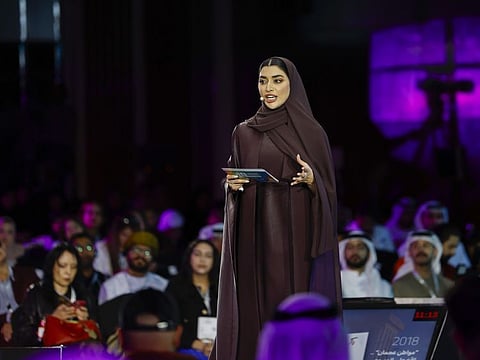UAE Nation pages cross 1 million followers, generate 173 million views
UAE laws, success stories of residents highlighted

Dubai: The UAE government has strengthened its communication channels with a strong focus on social media, a senior UAE government media official said.
Khadija Hussain, Executive Director – Government Communications at UAE Government Media Office, said at the 1 Billion Followers Summit that one of the key initiatives by the UAE government is its digital expansion on TikTok, Instagram, Facebook and You Tube, in both English and Arabic.
The pages going by the name UAE Nation produce video content in both English and Arabic, she said.
She explained that some videos focus on simplifying Dubai laws for Emiratis and expats. “The idea is to give a better understanding of the laws and procedures of the UAE. As part of this, legal experts are invited to make videos which are then posted on the various digital platforms set out by the UAE Nation.”
Inspirational stories of UAE residents and their success in the emirates are also highlighted, she added.
“Today, we have 208,700 followers with over 1.8 million likes on TikTok. That is just the English page. The Arabic page has 676,500 followers and over 4.5 million likes.”
She said on Instagram as well the @uaenation.uae page (Arabic version), there are over 72,000 followers with 733 posts, while the English page has over 69,000 followers with 315 posts.
Khadija showcased several examples and landmarks in her government communication career that paved the way for an organic transformation of work methods. She highlighted the replacement of traditional communication models by strategic government communication with the advent of new terms such as ‘engagement’, ‘responses’, ‘analysis of audience comments tone of voice’, and ‘measuring satisfaction’, towards moving to a full strategy for ‘Communication Through Social Media’.
She explained how new media influenced major transformations in the structure of government communications, altering concepts that were the norm for decades in terms of content, rhetoric, timing and audience targeting. Pushed into competition with a growing number of round-the-clock news platforms, government communications utilised the huge potential of social media channels, and the expanding base of news consumers who prefer shorter, faster news snippets on their phone screens.
Attractive content
The new reality of news traveling instantly meant that social media platforms became the inevitable choice for news editing teams in government entities. This, in turn, meant content had to be direct, simple and attractive, which reflected positively on the effectiveness of government communication, Khadija explained.
On what she called ‘endings that give rise to new beginnings’, she said that the success of communications teams depends heavily on riding the wave of new media. “We had to learn how to listen and how to respond around the clock. The changes we had to make were not limited to the structure of communication teams, but extended to changes in their skillset.
“The first ‘ending’ in a series of major transformations came as we moved from a singular focus on traditional media to publish government news, initiatives, resolutions and campaigns, to social media platforms. Our content is developed to fit these platforms as a priority.
“His Highness Sheikh Mohamed bin Rashid Al Maktoum, Vice President and Prime Minister of the UAE and Ruler of Dubai was the first inspiration for a prominent national and government presence across social media, as he launched his official account on Twitter (now X) in 2009, attracting over 27 million followers to become the first Arab and 11 international accounts among the world’s most influential leaders on social media. Today, Sheikh Mohammed bin Rashid’s account and other official government accounts, including @UAEGOV, have become the first approved source of government news in Dubai and the UAE,” she added.
The second ending, she noted, was the end of one-way communication. This gave rise to a phase of evaluations and decision making through new media. Finally came the beginning of partnerships with UAE citizens and residents to utilise their insights and expertise.
Another key landmark in the area of government communications was a shift of government news focus from direct awareness to more engagement through edutainment.
“We noticed at the UAE Government Media Office that some significant government news do not attract the expected attention among the audience, the youth in particular. Sometimes it is because the used terminology is too specialised, other times because the news does not relate directly to their everyday life. This inspired the launch of UAENation platform, where Emiratis present highlights of Emirati news, in a spontaneous, attractive and inspiring style in both Arabic and English,” she said.
“New media encourage our government to listen around the clock, welcome ideas through new platforms and celebrate creativity and accomplishments across the global stage. New media meant the end of the traditional government persona, and the beginning of a humanized government - one with voice and a heart,” she concluded.
Sign up for the Daily Briefing
Get the latest news and updates straight to your inbox
